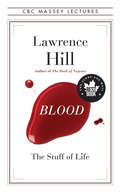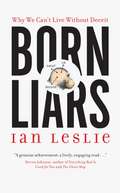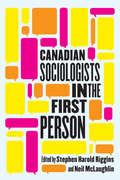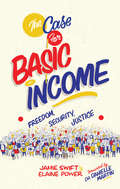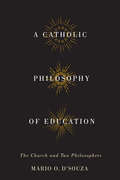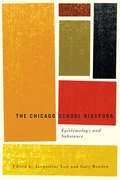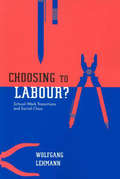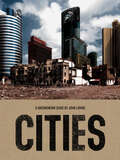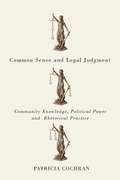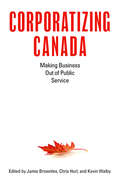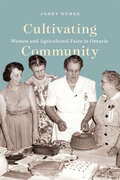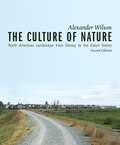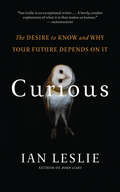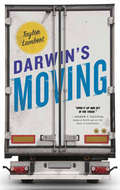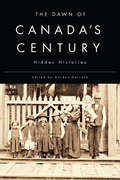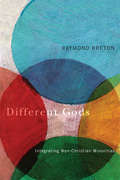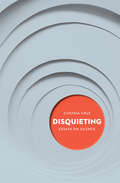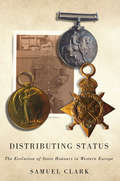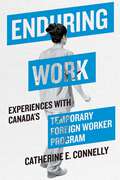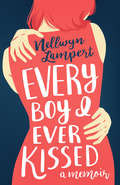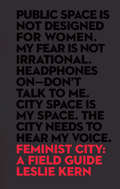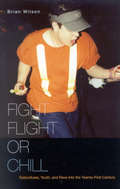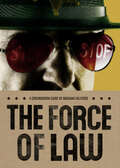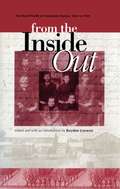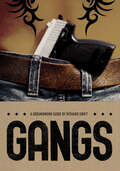- Table View
- List View
Blood: The Stuff of Life (The CBC Massey Lectures)
by Lawrence HillSelected for The Globe 100 Books in 2013. With the 2013 CBC Massey Lectures, bestselling author Lawrence Hill offers a provocative examination of the scientific and social history of blood, and on the ways that it unites and divides us today. Blood runs red through every person’s arteries and fulfills the same functions in every human being. The study of blood has advanced our understanding of biology and improved medical treatments, but its cultural and social representations have divided us perennially. Blood pulses through religion, literature, and the visual arts. Every time it pools or spills, we learn a little more about what brings human beings together and what pulls us apart. For centuries, perceptions of difference in our blood have separated people on the basis of gender, race, class, and nation. Ideas about blood purity have spawned rules about who gets to belong to a family or cultural group, who enjoys the rights of citizenship and nationality, what privileges one can expect to be granted or denied, whether you inherit poverty or the right to rule over the masses, what constitutes fair play in sport, and what defines a person’s identity. Blood: The Stuff of Life is a bold meditation on blood as an historical and contemporary marker of identity, belonging, gender, race, class, citizenship, athletic superiority, and nationhood.
Born Liars: Why We Can't Live Without Deceit
by Ian LeslieLying is an intrinsic part of our social fabric, but it is also a deeply problematic and misunderstood aspect of what makes us human. Ian Leslie takes us on a fascinating journey that makes us question not only our own relationship to the truth, but also virtually every daily encounter we have. On the way he dissects the history of the lie detector, how parents affect their children’s attitude to lying (and vice versa), Who Wants to Be a Millionaire?, the philosophical ambiguity of telling the truth, Bill Clinton’s presentational prowess, Wonder Woman’s lasso of truth, and why we should be wary of anyone with more than 150 Facebook friends. Born Liars is thought-provoking, anecdotally driven narrative nonfiction at its best. Ian Leslie’s intoxicating blend of anthropology, biology, cultural history, philosophy, and popular psychology belies a serious central message: that humans have evolved and thrived in large part because of their ability to deceive.
Canadian Sociologists in the First Person
by Stephen Harold Riggins and Neil McLaughlinSocial scientists' autobiographies can yield insight into personal commitments to research agendas and the very project of social science itself. But despite the long history of life writing, sociologists have tended to view the practice with skepticism.Canadian Sociologists in the First Person is the first book to survey the Canadian sociological imagination through personal recollections. Exploring the lives and experiences of twenty contributors from across the country, this book connects the unique and shared features of their careers to broad social dynamics while providing a guide to their own research and administrative contributions to their universities, their profession, and their broader society and communities. The contributors teach in different types of institutions, are prominent in the discipline and in their specializations, and represent significant and diverse intellectual currents, political perspectives, and life and career experiences.Aiming to start a broad conversation about what social science and the academic profession look like in Canada from an insider's perspective, Canadian Sociologists in the First Person offers invaluable lessons for younger scholars as they envision a diverse sociological imagination for the twenty-first century.
The Case for Basic Income: Freedom, Security, Justice
by Jamie Swift Elaine PowerInequality is up. Decent work is down. Free market fundamentalism has been exposed as a tragic failure. In a job market upended by COVID-19—with Canadians caught in the grip of precarious labour, stagnant wages, a climate crisis, and the steady creep of automation—an ever-louder chorus of voices calls for a liveable and obligation-free basic income. Could a basic income guarantee be the way forward to democratize security and intervene where the market economy and social programs fail? Jamie Swift and Elaine Power scrutinize the politics and the potential behind a radical proposal in a post-pandemic world: that wealth should be built by a society, not individuals. And that we all have an unconditional right to a fair share. In these pages, Swift and Power bring to the forefront the deeply personal stories of Canadians who participated in the 2017–2019 Ontario Basic Income Pilot; examine the essential literature and history behind the movement; and answer basic income’s critics from both the right and left.
Catholic Philosophy of Education: The Church and Two Philosophers
by Mario O. D'SouzaToday’s pluralist and multicultural society raises questions about how to teach religiously and ethnically diverse students in Catholic schools. A Catholic Philosophy of Education addresses these challenges by examining the documents from the Roman Congregation for Catholic Education alongside the writings of Jacques Maritain and Bernard Lonergan. Mario D’Souza proposes a contemporary formulation for a Catholic philosophy of education in which the ideals of Catholicism form the basis for the mission of the Catholic school. Drawing on the Church’s educational documents, and informed by Maritain and Lonergan, D’Souza explains how the unifying anthropology of Catholic education enables Catholic schools to serve amidst diversity by avoiding the extremes of religious exclusivism and fundamentalism, on the one hand, and relativism and individualism, on the other. He explores the aims of Catholic schools in relation to students, teachers, and society, and the relationship between goodness, discipline, and knowledge. He argues that students must be educated for personal and communal freedom and authenticity, and to strive for the common good, suggesting how a Catholic philosophy of education can provide the framework for such personal and communal transformation. Essential reading for new and experienced Catholic educators, A Catholic Philosophy of Education demonstrates that Maritain and Lonergan have much to offer in service of an education that is liberating, instructive, illuminating, and integrative.
The Chicago School Diaspora: Epistemology and Substance
by Jacqueline Low Gary BowdenWhen the University of Chicago was founded in 1892 it established the first sociology department in the United States. The department grew rapidly in reputation and influence and by the 1920s graduates of its program were heading newly formed sociology programs across the country and determining the direction of the discipline and its future research. Their way of thinking about social relations revolutionized the social sciences by emphasizing an empirical approach to research, instead of the more philosophical "armchair" perspective that previously prevailed in American sociology. The Chicago School Diaspora presents work by Canadian and international scholars who identify with what they understand as the "Chicago School tradition." Broadly speaking, many of the scholars affiliated with sociology at Chicago understood human behaviour to be determined by social structures and environmental factors, rather than personal and biological characteristics. Contributors highlight key thinkers and epistemological issues associated with the Chicago School, as well as contemporary empirical research. Offering innovative theoretical explanations for the diversity and breadth of its scholarly traditions, The Chicago School Diaspora offers a fresh approach to ideas, topics, and approaches associated with the origins of North American sociology. Contributors include Michael Adorjan (University of Hong Kong, China), Gary Bowden (University of New Brunswick), Jeffrey Brown (University of New Brunswick), Tony Christensen (Wilfrid Laurier University), Luis Cisneros (postdoctoral scholar, University of Arizona), Gary A. Cook (Beloit College), Mary Jo Deegan (University of Nebraska-Lincoln), Scott Grills (Brandon University), Mervyn Horgan (University of Guelph), Mark Hutter (Rowan University), Benjamin Kelly (Nipissing University), Rolf Lindner (Humboldt University & HafenCity University, Germany), Jacqueline Low (University of New Brunswick), Mourad Mjahed (Peace Corps, Rabat, Morocco), DeMond S. Miller (Rowan University), Edward Nell (New School for Social Research), David A. Nock (Lakehead University), Defne Över (PhD candidate, Cornell University), George Park (Memorial University), Thomas K. Park (University of Arizona), Dorothy Pawluch (McMaster University), Robert Prus (University of Waterloo), Antony J. Puddephatt (Lakehead University), Isher-Paul Sahni (Concordia University), Roger A. Salerno (Pace University), William Shaffir (McMaster University), Greg Smith (University of Salford, UK), Robert A. Stebbins (University of Calgary), Izabela Wagner (Warsaw University, Poland and CEMS EHESS - School for Advanced Studies in Social Sciences, France), and Yves Winkin (ENS Lyon, France).
Choosing to Labour?: School-Work Transitions and Social Class
by Wolfgang LehmannYoung people about to leave high school argue that they are determining their own destinies. Scholarly debates also suggest that the influence of structural factors such as social class on an individual's life course is decreasing. Wolfgang Lehmann challenges this view and offers a detailed comparative analysis of the inter-relationships between social class, institutional structures, and individual educational and career choices. Through a qualitative study of academic-track high school students and participants in youth apprenticeships in Germany and Canada, Lehmann shows how the range of available school-work transition options are defined by both gender and social class. Highlighting the importance of the institutional context in understanding school-work transitions, particularly in relation to Germany's celebrated apprenticeship system, which rests on highly streamed secondary schooling and a stratified labour market, Lehmann argues that social inequalities are maintained in part by the choices made by young people, rather than simply by structural forces. Choosing to Labour? concludes with an exploration of how public policy can meet the dual challenge of providing young people with meaningful and equitable educational experiences, while simultaneously fulfilling the need for a skilled workforce.
Cities: A Groundwork Guide (Groundwork Guides)
by John LorincA thought-provoking look at the demands and expectations we place on our growing cities in the twenty-first century. An excellent introduction to the subject for young adults. Today, more people live in cities than in rural areas. The search for better housing, transit, economic opportunity, and security within neighbourhoods forces today's city-dwellers -- in both the developed world and in megacities in Asia, Africa, and Latin America -- to confront what it means to live in our urban world. In this book, cities specialist John Lorinc considers the enormous implications of the mass migration away from rural regions, and predicts that solutions will emerge from neighbourhoods and dynamic networks linking communities to governments and the broader urban world. "[The Groundwork Guides] are excellent books, mandatory for school libraries and the increasing body of young people prepared to take ownership of the situations and problems previous generations have left them." -- Globe and Mail Correlates to the Common Core State Standards in English Language Arts: CCSS.ELA-LITERACY.RI.6.1 Cite textual evidence to support analysis of what the text says explicitly as well as inferences drawn from the text. CCSS.ELA-LITERACY.RI.6.2 Determine a central idea of a text and how it is conveyed through particular details; provide a summary of the text distinct from personal opinions or judgments. CCSS.ELA-LITERACY.RI.6.3 Analyze in detail how a key individual, event, or idea is introduced, illustrated, and elaborated in a text (e.g., through examples or anecdotes). CCSS.ELA-LITERACY.RI.6.4 Determine the meaning of words and phrases as they are used in a text, including figurative, connotative, and technical meanings. CCSS.ELA-LITERACY.RI.6.6 Determine an author's point of view or purpose in a text and explain how it is conveyed in the text.
Common Sense and Legal Judgment: Community Knowledge, Political Power, and Rhetorical Practice
by Patricia CochranWhat does it mean when a judge in a court of law uses the phrase “common sense”? Is it a type of evidence or a mode of reasoning? In a world characterized by material and political inequalities, whose common sense should inform the law? Common Sense and Legal Judgment explores this rhetorically powerful phrase, arguing that common sense, when invoked in political and legal discourses without adequate reflection, poses a threat to the quality and legitimacy of legal judgment. Often operating in the service of conservatism, populism, or majoritarianism, common sense can harbour stereotypes, reproduce unjust power relations, and silence marginalized people. Nevertheless, drawing the works of theorists such as Thomas Reid, Antonio Gramsci, and Hannah Arendt into conversation with rulings by the Supreme Court of Canada, Patricia Cochran demonstrates that with careful attention, the democratic, egalitarian, and community-sustaining aspects of common sense can be brought to light. A call for critical self-reflection and the close scrutiny of power relationships and social contexts, this book is a direct response to social justice predicaments and their confounding relationships to law. Creative and interdisciplinary, Common Sense and Legal Judgment reinvigorates feminist and anti-poverty understandings of judgment, knowledge, justice, and accountability.
Corporatizing Canada: Making Business out of Public Service
by Jamie Brownlee Chris Hurl Kevin WalbyFrom schools to hospitals, from utilities to food banks, over the past thirty years corporatization has transformed the public sector in Canada. Economic elites take control of public institutions and use business metrics to evaluate their performance, transforming public programs into corporate revenue streams. Senior managers use corporate methodology to set priorities in social services and create “market-friendly” public sector cultures. Even social activist organizations increasingly look and act like multinational corporations while non-governmental organizations pursue partnerships with the same corporations they ostensibly oppose. Corporatizing Canada critically examines how corporatization has been implemented in different ways across the Canadian public sector and warns us of the threat that neoliberal corporatization poses to democratic decision-making and the public at large.
Cultivating Community: Women and Agricultural Fairs in Ontario (McGill-Queen's Rural, Wildland, and Resource Studies)
by Jodey NurseFor close to two hundred years, families and individuals across Ontario have travelled down country roads and gathered to enjoy seasonal agricultural fairs. Though some features of township and county fairs have endured for generations, these community events have also undergone significant transformations since 1850, especially in terms of women’s participation.Cultivating Community tells the story of how women’s involvement became critical to agricultural fairs’ growth and prosperity. By examining women’s diverse roles as agricultural society members, fair exhibitors, performers, volunteers, and fairgoers, Jodey Nurse shows that women used fairs’ manifold nature to present different versions of rural womanhood. Although traditional domestic skills and handicrafts, such as baking, needlework, and flower arrangement, remained the domain of women throughout this period, women steadily enlarged their sphere of influence on the fairgrounds. By the mid-twentieth century they had staked out a place in venues previously closed to them, including the livestock show ring, the athletic field, and the boardroom.Through a wealth of fascinating stories and colourful detail, Cultivating Communities adds a new dimension to the social and cultural history of rural women, placing their activities at the centre of the agricultural fair.
The Culture of Nature: North American Landscape from Disney to Exxon Valdez
by Alexander WilsonSince it was first published in 1991, few books have come close to capturing the depth and breadth of Alexander Wilson’s innovative ecocultural compendium The Culture of Nature. His work was one of the first of its kind to investigate the ideology of the environment, to critique the future according to Disney, and illustrate that the ways we think, teach, talk about, and construct the natural world are as important a terrain as the land itself. Extensively illustrated and meticulously researched, this edition is exquisitely revised and reissued for the Anthropocene.
Curious: The Desire to Know and Why Your Future Depends On It
by Ian LeslieThe latest from Ian Leslie, the author of Born Liars, a Globe and Mail Top 100 Book, is a fascinating look at the human characteristic of curiosity — our extraordinary capacity to take pleasure in discovering, learning, and understanding.Curious shows how the practice of “deep curiosity” — persistent, self-reflective seeking of knowledge and insight — is key to the success of our careers, the happiness of our children, the strength of our relationships, and the progress of societies. But it also argues that it is a fragile quality, which wanes and waxes over time, and that we take it for granted at our peril. Ian Leslie proposes that the Internet is opening up a “curiosity gap,” by exacerbating the divide between those with a large cognitive appetite, and those happy knowing no more than they have to know; between the curious and the incurious. He draws on many sources and stories to illustrate his points: Benjamin Franklin at Portsmouth Harbour studying the effect of oil on choppy waters; a bored Galileo distracting himself in a Pisa cathedral by observing the swinging of a recently lit lamp; Leonardo da Vinci doodling ideas in his notebook; Google co-founder Larry Page’s thoughts on the perfect search engine; the invention of the microwave oven; the advantages of your local bookseller over Amazon’s algorithms; a reassessment of Donald Rumsfeld’s defense strategy, and many more.Rich, textured, and exciting, Curious is a new take on the most absorbing human trait of all.
Darwin's Moving
by Taylor LambertDarwin’s Moving introduces readers to the colourful characters who populate the furniture moving trade, a male-dominated world of labour with relatively high pay and no need for education of any sort. Movers have a unique window into the private spaces of the city as they perform their difficult and delicate job inside all manner of homes, from government-subsidized housing developments to multi-million dollar McMansions. Taylor Lambert intriguingly explores class and work in a city that would rather focus on the wealth and prosperity brought to it by the oil and gas industry. Darwin’s Moving shows us the Other Calgary, a world populated by transient men and women struggling to survive in a boomtown’s shadow. Darwin’s Moving takes us behind the scenes of a business that is almost completely undocumented in Canadian literature.
The Dawn of Canada's Century: Hidden Histories
by Gordon DarrochSir Wilfrid Laurier famously claimed that the twentieth century would be Canada's century and, indeed, its opening decade witnessed remarkable territorial, demographic, and social transformations. Yet the lives of those who lived and laboured to fashion these changes remain largely hidden from historical view. The Dawn of Canada's Century presents close and systematic interpretations of everyday lives based on the first national sample of the 1911 census. Written by many of Canada's leading historical researchers, The Dawn of Canada's Century demonstrates the wide-ranging and revealing social histories made possible by the new Canadian Century Research Infrastructure, an innovative database of national samples of decennial census microdata, from 1911 through 1951. This revealing collection sheds new light on topics including identity and language, the socio-demography of aboriginal populations, national labour market dynamics, earnings distributions, social mobility, gender and immigration experiences, and the technologies of census taking. Situating early twentieth-century Canada within international historical population studies, these essays provide new ways to understand individuals' lives and connect them to larger structural changes. Contributors include Peter Baskerville (Alberta), Claude Bellevance (Université du Quebéc à Trois Rivière), Sean T. Cadigan (Memorial), Gordon Darroch (York), Lisa Dillon (UdeM), Chad Gaffield (SSHRC), Danielle Gauvreau (Concordia), Gustave Goldmann (Ottawa), Adam J. Green (Ottawa), Kris Inwood (Guelph), Charles Jones (Toronto), Richard Marcoux (Laval), Mary MacKinnon (McGill), Chris Minns (London School of Economics), Byron Moldofsky (Toronto), France Normand (Université du Quebéc à Trois Rivière), Stella Park (Toronto), Terry Quinlan (Newfoundland and Labrador Statistics Agency), Laurent Richard (Laval), Katharine Rollwagen (Ottawa), Evelyn Ruppert (Goldsmiths, University of London), Eric W. Sager (Victoria), Marc St-Hilaire (Laval), and Patricia Thornton (Concordia).
Different Gods: Integrating Non-Christian Minorities into a Primarily Christian Society
by Raymond BretonIn recent decades the ebb and flow of immigration to Canada has changed significantly, with the majority of immigrants coming from non-European countries. A striking feature of this shift is that a significant proportion of immigrants are non-Christians newly immersed in a society entrenched in Christian ideals. In Different Gods, Raymond Breton looks at the significance of religious differences and what they mean for immigrants, non-immigrants, and Canada's future. Breton examines the evolution over time of the religious attitudes and behaviour of the new minorities and the challenges that their presence poses to the receiving society. The analysis consists of a review of recent research and formulates possible conclusions about the transformations that integration may bring about for both the minorities and the receiving society. An important analysis of immigration in an era of rapidly changing social values, Different Gods looks boldly into issues of collective identity and cultural accommodation.
Disquieting: Essays on Silence
by Cynthia CruzHow do our bodies speak for us when words don’t suffice? How can we make ourselves understood when what we have to say is inarticulable?In Disquieting, Cynthia Cruz tarries with others who have provided examples of how to “turn away,” or reject the ideologies of contemporary Neoliberal culture. These essays inhabit connections between silence, refusal, anorexia, mental illness, and Neoliberalism. Cruz also explores the experience of being working-class and poor in contemporary culture, and how those who are silenced often turn to forms of disquietude that value open-endedness, complexity, and difficulty.Disquieting: Essays on Silence draws on philosophy, theory, art, film, and literature to offer alternative ways of being in this world and possibilities for building a new one.
Distributing Status: The Evolution of State Honours in Western Europe
by Samuel ClarkHonorific rewards are all about status and illustrate status processes in a way that few other social phenomena do. Why do we have so many honorific awards and prizes? Although they are a major feature of modern societies, they have received little scholarly attention. Samuel Clark argues that answering this question requires a separate historical analysis of different awards and prizes. He presents a comprehensive explanation of the origins and evolution of state honours in the British Isles, France, and the Low Countries. Examining cultural, social, and political changes that led to the massive growth in state honours and shaped their characteristics, Distributing Status also demonstrates their functions as instruments of cultural power, collective power, disciplinary power, and status power. Clark supports his conclusions with a cross-cultural statistical analysis of twenty societies. Lucid and logical, Distributing Status explicates an important historical change in Western Europe while at the same time contributing to several bodies of sociological literature, including evolutionary theory, theories of collective action, writings on discipline in modern societies, and studies of status processes.
Enduring Work: Experiences with Canada’s Temporary Foreign Worker Program
by Catherine E. ConnellyIf you believed most of what’s said about the Canadian Temporary Foreign Worker program, you might naturally assume that there is a trade-off between workers’ poor experiences with the program and employers’ significant benefits. In reality, the experiences of workers are far worse than is commonly acknowledged, while employers are not reaping as much benefit as the public might suppose.In Enduring Work Catherine Connelly draws on over one hundred interviews with people connected to different aspects of this program, analyzing their experiences from the perspective of organizational behaviour and human resources management. She compares the lived reality of agricultural workers, in-home caregivers, and low- and high-wage workers, showing how and why each group is vulnerable to mistreatment, albeit in different ways. She further explores how employment agencies and immigration consultants contribute to program abuses. Critically, Enduring Work provides the perspectives of employers, distinguishing between the reluctant users of the program who follow the rules and the reckless users who do not.Groundbreaking in its analysis of an issue very much in the news, Enduring Work unpacks the harms within Canada’s Temporary Foreign Worker program and offers nuanced strategies to improve it.
Every Boy I Ever Kissed
by Nellwyn LampertA bold step toward a new cultural narrative around sex Sex was supposed to be easy. It was supposed to be fun, liberating, and empowering for a girl who’d been brought up thinking the battle for sexual equality had been won. But for Nellwyn Lampert, losing her virginity would turn out to be anything but simple. Whether she was being confronted with porn-induced erectile dysfunction or other crises of masculinity, nothing went according to plan in the bedroom. Instead, Nellwyn had to learn to navigate the realities of sexual liberation, female empowerment, and masculinity all on her own. In this coming-of-age memoir, Nellwyn looks back on her experiences with humour and insight to explore what true liberation and empowerment may look like for today’s young women. Her many unexpected adventures will prompt reflection on a bigger question: What does it mean when our experiences fail to live up to who we think we should be as liberated, postmodern women?
Feminist City: A Field Guide
by Leslie KernLeslie Kern wants your city to be feminist. An intrepid feminist geographer, Kern combines memoir, theory, pop culture, and geography in this collection of essays that invites the reader to think differently about city spaces and city life. From the geography of rape culture to the politics of snow removal, the city is an ongoing site of gendered struggle. Yet the city is perhaps also our best hope for shaping new social relations based around care and justice. Taking on fear, motherhood, friendship, activism, and the joys and perils of being alone, Kern maps the city from new vantage points, laying out a feminist intersectional approach to urban histories and pathways towards different urban futures.
Fight, Flight, or Chill: Subcultures, Youth, and Rave into the Twenty-First Century
by Brian WilsonFight, Flight or Chill explores the extent to which raver youths' experiences are constrained or determined by individualistic, high-tech, mass-mediated Western culture in which alienated and unfulfilled youth are apparently more at-risk for escapist and thrill-seeking behaviours. Wilson considers how raver youth creatively and proactively subvert these constraints in novel and empowering ways - from political activism to symbolic and stylistic expressions of resistance to community-building efforts. He also discusses the globalization and political economy of rave and youth culture and examines the ideologies that underlie simple solutions to the complex concerns over young people today.
The Force of Law: A Groundwork Guide (Groundwork Guides)
by Mariana ValverdeThis book examines the meaning of law from a global perspective and the many connections between law and law enforcement. An excellent introduction to the subject for young adults. Most of us in liberal democratic countries think that we live under the rule of law. Governments make the rules, we live by them and the police enforce them if we try to break them. The Force of Law critically examines these assumptions. Award-winning criminologist Mariana Valverde makes clear that while the law is usually regarded as the civilized, non-violent way to deal with harms and conflicts, violence is integral to law. After all, police are authorized to handcuff, manhandle, taser, and even kill people, and courts of law confine people to prison and, in some countries, order that they be put to death. Valverde shows that "proper" law is not always distinguishable from the rules imposed by various bodies of armed men. Worldwide, private security guards often act like police, but they serve their private clients, not the public at large. And publicly paid police officers spend much of their time managing information for other bureaucracies, instead of actually fighting crime or arresting criminals. "[The Groundwork Guides] are excellent books, mandatory for school libraries and the increasing body of young people prepared to take ownership of the situations and problems previous generations have left them." — Globe and Mail Correlates to the Common Core State Standards in English Language Arts: CCSS.ELA-LITERACY.RI.6.1 Cite textual evidence to support analysis of what the text says explicitly as well as inferences drawn from the text. CCSS.ELA-LITERACY.RI.6.2 Determine a central idea of a text and how it is conveyed through particular details; provide a summary of the text distinct from personal opinions or judgments. CCSS.ELA-LITERACY.RI.6.3 Analyze in detail how a key individual, event, or idea is introduced, illustrated, and elaborated in a text (e.g., through examples or anecdotes). CCSS.ELA-LITERACY.RI.6.6 Determine an author's point of view or purpose in a text and explain how it is conveyed in the text.
From the Inside Out: The Rural Worlds of Mennonite Diarists
by Royden LoewenHistorian Royden Loewen has brought together selections from diaries kept by 21 Mennonites in Canada between 1863 and 1929, some translated from German for the first time. By skillfully comparing and contrasting a wide cross-section of lives, Loewen shows how these diaries often turn the hidden contours of household and community "inside out." The writers featured were ordinary rural people: young women and grandmothers, rural preachers and landless householders. They include a teenaged boy who immigrated from Russia to Manitoba in 1875 as well as a successful merchant, a traveling evangelist, and a devout, conservative church elder. An elderly grandfather recounted the daily circuit of his children's homes, while 19-year-old Marie Schoeder wrote of her literary aspirations, her "secret hope" that some day she would "write things that have a real worth, things that are worth printing, and things that other folks would love to read and pay for." From the Inside Out also contrasts diaries from two distinct Mennonite communities in Canada. The Swiss-American Mennonites in Waterloo County, Ontario, faced rapid urbanization, while the Dutch-Russian Mennonites in southern Manitoba maintained their more rural environment. The diaries mirror their writers' preoccupations with work and weather, but they also reveal a communityís social structure and round of activities such as weddings, funerals, and worship services. In the process of diary-keeping, the writers sought to make sense of a dynamic and often unpredictable world. Reading what they chose to record is to learn much about their culture. Their writings provide glimpses of their lives, their collective mindset, and their history as a people.
Gangs: A Groundwork Guide (Groundwork Guides)
by Richard SwiftA Booklist Editors’ Choice and a Society of School Librarians International (SSLI) Honor Book Street gangs have exploded worldwide. Tattoos, baggy pants, tagging, gangsta style, the unspoken threat -- it's all just around the corner in most of the world's major cities. From the streets of Los Angeles to the shantytowns of Cape Town, hundreds of thousands of "at risk" youth are deciding whether they should join their local gang. Violence, guns, the drug trade, racism, poverty, families under pressure and ever-widening slums all provide a witch's brew in which the youth gang tempts young males and females with a sense of identity and belonging that their world has denied them. Gangs exposes the roots of the problem as it moves from the banlieues of France to the favelas of Brazil. It offers a startling analysis of the complicity of the official adult world and some controversial ideas for reforms that might just undermine the appeal of gang life. For many of the world's young -- especially those who are poor -- joining a gang is a real career choice. It is a choice that can be as deadly for young gangsters as for their victims. Richard Swift shows us that we fail to understand gangs at our peril.
